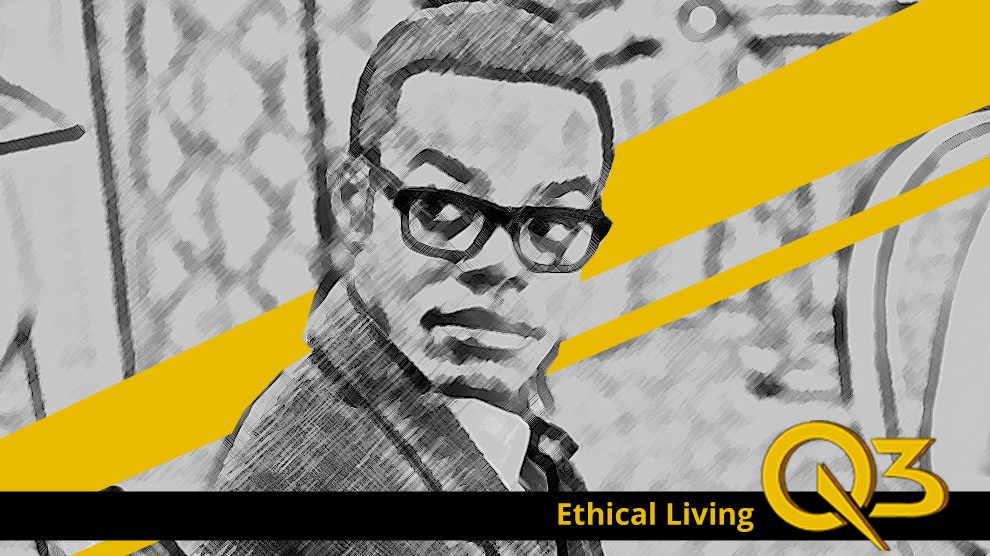by Charlotte Ennis
The Good Place is a charming and unique look at a version of the afterlife and how one can truly be selfless. Throughout the show, the character Chidi Anagonye, a professor of philosophy and ethics, tries to teach his morally bankrupt soulmate Eleanor Shellstrop how to live a better life and about the ethics and philosophers who have theories of how to achieve this. The Good Place thus provides a casual review of a wide array of relevant theoretical principles, from KantÔÇÖs work to the notion of Utilitarianism.
The philosopher Immanuel Kant, who is referred to in The Good Place, has the theory that the rightness or wrongness of our actions does not depend on the consequences but whether or not we have fulfilled our duty. Kant believed there was a supreme principle of morality and he referred to it as The Categorical Imperative. The Categorical Imperative is characterized by Kant as a rationally necessary and unconditional principle that we must always follow despite any natural contrary desires. KantÔÇÖs theory is one of the early forms of Contractualism, a concept developed by Scanlon, an American philosopher, talks about Contractualism in his book What We Owe To Each Other. This book features heavily in the show. The major theory of this philosophy is that an action would be disallowed by a set of principles for the regulation of behaviour that no one could reasonably reject. These principles would act as a basis for general agreement. However, Scanlon is also concerned with which forms of reasoning are justifiable. Scanlon splits the difference between right and wrong as something is wrong because it is unjustifiable, while something is good because it is not wrong. Because Contractualism relies on reasoning, it suggests that as all humans have reasoning they must agree to the principles provided in line with Contractualism, as these rules are a product of reasoning, a trait which all humans have and so cannot reject. This theory, although used and relied upon in The Good Place by the lovable Chidi, is perhaps not the most versatile approach when considering how specific rules are made.
The most interesting part of Contractualism, in my opinion, is the ideal of respecting one anotherÔÇÖs autonomy and so not interfering with each otherÔÇÖs projects. Although this is an attractive proposal, it seems if reduced to lead to a confusing set of actions which may not lead to the most happiness. In the imaginary construction of rules, it seems there will be rules for us not to interfere with others but no rules for intervening, for example; there will be rules for not taking lives but no rules for saving lives. Pete Singer, an Australian philosopher, produced an example of what it means to not interfere. His example is of a man called Carl, who on the way to work passes a shallow pond in which a child is drowning. No one else is around and so it seems obvious he should intervene and save the child. He will save a childÔÇÖs life, making their parents happy whilst only causing himself minor inconveniences such as a muddy suit and being late for work. If he chooses not to help, the child will die, which although seems to be a moral failing, Carl would not have breached any rules of non-interference and so would not have actively caused the childÔÇÖs death. This shows a huge gap in the reach of Contractualism and perhaps how applicable it is to real life.
In contrast to Contractualism there is Utilitarianism, a concept developed by philosophers Bentham and Mill. Utilitarianism focuses on the end result of an action. In a nutshell, Utilitarianism suggests that it is best to choose whatever option produces the best results or the most ÔÇÿutilityÔÇÖ. This translates to producing as much good as possible. There are two different types of Utilitarianism; Act Utilitarianism focuses on the effects of individual actions whilst Rule Utilitarianism on the effects of types of actions. Although it seems like a useful and simple approach and we see it explored in ÔÇÿThe Trolley ProblemÔÇÖ in The Good Place, Utilitarianism can also be used to justify the intense suffering of a few for the happiness of a larger group of people. This is where the difference between Act and Rule Utilitarianism comes in to play. Although Act Utilitarianism allows for huge injustice to smaller groups of people in the name of happiness for a larger group, Rule Utilitarianism, a newer form of Utilitarianism suggests that actions should be judged on their conformity to rules, which in turn should match the original terms of utility and result in as much good as possible. For example, Act Utilitarianism might justify a system of slavery if there are fewer slaves than there are slave-owners, as more people are experiencing happiness. However, Rule Utilitarianism takes into account laws regarding slavery and realises these laws produce maximum utility. Rule Utilitarianism is flawed though, as there will always be conflict over which laws and rules to implant and it is often the case that there are ineffective or no laws on particular injustices.
In conclusion, it is easy to see why Eleanor and Chidi struggle so much with making good decisions as depending on which theory you follow there will always be a different answer. The show has inspired a new interest in Philosophy and Ethics and I cannot wait to see what ethical problem Eleanor and Chidi have to tackle next.











